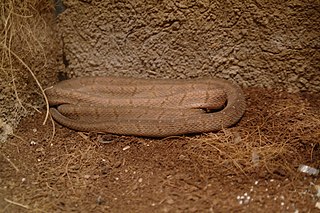
Dasypeltis is a genus of colubrid snakes. It is one of only two taxonomic groups of snakes known to have adapted to feed exclusively on eggs. Dasypeltis are non-venomous and found throughout the continent of Africa, primarily in forested or wooded habitats that are also home to numerous species of birds.

Dasypeltis scabra, also known commonly as the common egg eater, the egg-eating snake, and the rhombic egg eater, is a species of snake in the family Colubridae. The species is endemic to Africa.

The Arabian cobra is a species of venomous snake in the family Elapidae. The species is endemic to the Arabian Peninsula.

Dasypeltis medici, known commonly as the East African egg-eater and the eastern forest egg-eater, is a species of nonvenomous snake in the family Colubridae. The species is endemic to Africa.

Dasypeltis atra, commonly known as the African egg-eating snake or montane egg-eater, is a species of non-venomous snake in the family Colubridae. The species is endemic to Africa.
Dasypeltis confusa, commonly known as the confusing egg-eater or the diamond-back egg-eater, is a species of snake in the family Colubridae. The species is endemic to Africa.

Dasypeltis fasciata, commonly known as the Central African egg-eating snake or the western forest eggeater, is a species of snake in the family Colubridae. The species is endemic to Africa. It is one of 18 species in the genus Dasypeltis, and is occasionally kept in captivity as an exotic pet along with other members of its genus, particularly D. scabra and D. medici.
Dasypeltis abyssina, commonly known as the Ethiopian egg-eater, is a species of non-venomous snake in the family Colubridae. The species is endemic to Ethiopia.
Dasypeltis bazi, commonly known as the Egyptian egg-eating snake or Baz's egg-eating snake, is a species of non-venomous snake in the family Colubridae. The species is found in Egypt.
Dasypeltis congolensis is a species of non-venomous snake in the family Colubridae. The species is found in the Republic of Congo, Democratic Republic of Congo, Gabon, Angola, and Zambia.
Dasypeltis crucifera, commonly known as the cross-marked egg-eater, is a species of non-venomous snake in the family Colubridae. The species is found in Eritrea.
Dasypeltis gansi, commonly known as Gans's egg-eater or Gans' egg-eating snake, is a species of non-venomous snake in the family Colubridae. The species is native to West Africa.
Dasypeltis inornata, commonly known as the southern brown egg-eater, is a species of non-venomous snake in the family Colubridae. The species is found in South Africa and Eswatini.
Dasypeltis latericia is a species of non-venomous snake in the family Colubridae. The species is found in Senegal, Guinea, and Mali.
Dasypeltis loveridgei, commonly known as the dwarf egg-eater, is a species of non-venomous snake in the family Colubridae. The species is found in South Africa and Namibia.
Dasypeltis palmarum, commonly known as the palm egg-eater, is a species of non-venomous snake in the family Colubridae. The species is found in Angola, the Republic of the Congo, and the Democratic Republic of the Congo.
Dasypeltis parascabra is a species of non-venomous snake in the family Colubridae. The species is found in Guinea, Ivory Coast, Liberia, Ghana, Togo, and Nigeria.
Dasypeltis sahelensis, the Sahel egg-eater, is a species of non-venomous snake in the family Colubridae. The species is found in Senegal, Mali, Burkina Faso, Niger, Nigeria, Morocco, Western Sahara, Mauritania, and Chad.
Dasypeltis taylori is a species of non-venomous snake in the family Colubridae. The species is found in Somalia and Djibouti.




